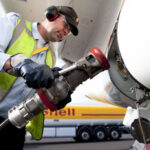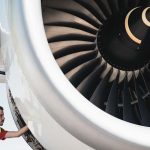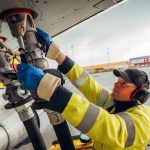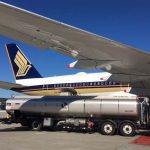Released as part of the European Commission’s ‘Fit for 55’ climate package, the long-anticipated ReFuelEU Aviation proposal confirms imposing a mandate on fuel suppliers to include sustainable aviation fuel (SAF) in aviation fuel supplied at EU airports. The obligation would commence from 2025 at 2% SAF, gradually increasing to 63% in 2050. The proposal also includes a sub-obligation of 0.7% for e-kerosene from 2030. To avoid fuel tankering, an obligation is also placed on aircraft operators to uplift fuel from EU airports. EU airports are further required to supply the necessary infrastructure for storage and blending of SAF to allow fuel suppliers and airlines to meet their obligations. While the proposal has found general support amongst stakeholders, reports Susan van Dyk, IATA and the World Economic Forum’s Clean Skies to Tomorrow (CST) coalition argue a mandate, while positive, will not be sufficient to support SAF development and that production incentives should also be introduced.
The proposed regulation aims to create a level playing field through EU-wide harmonised rules for SAF and avoid disparate national regulations. Its main elements are directed at three different sets of stakeholders: aviation fuel suppliers, airlines and airports.
The central component of the Regulation is a mandate on fuel suppliers to blend a minimum volume percentage of SAF in the aviation fuel supply, with a separate minimum for e-kerosene (the aviation category of e-fuels) from 2030:
- 2% from 2025;
- 5% from 2030, with a minimum of 0.7% e-kerosene;
- 20% from 2035, with a minimum of 5% e-kerosene;
- 32% from 2040, with a minimum of 8% e-kerosene;
- 38% by 2045; with a minimum of 11% e-kerosene; and
- 63% by 2050, with a minimum of 28% e-kerosene.
Two aspects of the mandate are notable. Firstly, the obligation is placed on the fuel suppliers rather than the airlines and, consequently, all flights departing from EU airports will be covered. Secondly, the mandate is based on volume rather than the potential carbon intensity reduction of the SAF.
According to the proposal, e-fuels have the highest potential for decarbonisation of all fuel technologies considered under this initiative and therefore a dedicated sub-obligation is provided to push e-fuel introduction into the market. As explained in the proposal, the emergence of e-fuels on the market in sizeable volumes by 2030 is unlikely in the absence of dedicated policy support due to their high cost. The dedicated sub-mandate is expected to partly de-risk investments in e-fuels and promote scale-up of production capacity.
In addition to the obligation on fuel suppliers, a ‘refuelling obligation’ is placed on airlines, providing that “the yearly quantity of aviation fuel uplifted by a given aircraft operator at a given Union airport shall be at least 90% of the yearly aviation fuel required.” This is designed to address fuel tankering practices, where aircraft operators uplift more aviation fuel than necessary at a given airport with the aim to avoid refuelling partially or fully at a destination airport where aviation fuel is more expensive. This practice can lead to increased emissions (carbon leakage) due to higher fuel burn and undermines fair competition in the market. As the inclusion of SAF is expected to increase aviation fuel costs, the proposal anticipates fuel tankering may increase. Therefore, the regulation requires that the amount of fuel uplifted by an aircraft should be commensurate with the amount of fuel necessary to operate the flights departing from that airport. Monitoring of this provision will be carried out through reporting obligations on airlines.
Finally, a requirement is placed on EU airports to provide the infrastructure for the delivery, storage and uplifting of SAF according to the obligation.
The proposal envisages fuel suppliers, airports and aircraft operators may not have the technology and logistical infrastructure available to meet mandating requirements at every airport. Therefore the regulation would provide for flexibility in this regard within the first five years of its application. Up to 2030, fuel suppliers would not be required to distribute mandated SAF blends at every airport but can meet their obligation by supplying a higher share of SAF at certain airports, provided that the fuel supplier complies with the mandate based on their average annual fuel supplied. From 2030-2035, fuel suppliers must supply at least a 2% blend of SAF at every airport.
The proposed regulation does not include provision for a book-and-claim system, although it is not excluded as a future possibility, provided that it be governed by robust rules ensuring the environmental integrity of the system.
Eligible SAFs under the regulation are advanced biofuels and e-fuels, and feed and food crop-based biofuels are not included. However, SAF produced from waste lipids will be eligible in order to launch the market and allow for emission reductions in the short term. Sustainability criteria established in the Renewable Energy Directive (RED II) will be used to determine eligibility of SAFs.
The remainder of the proposal deals with reporting obligations and penalties for non-compliance with the regulation.
It would only apply to commercial flights in civil aviation, and exclude military aircraft and aircraft engaged in operations for humanitarian, search, rescue and disaster relief of medical purposes, as well as customs, police and fire-fighting operations. Further parties excluded would be aircraft operators and airports that operate below a minimum threshold. A threshold of yearly passenger air traffic and freight traffic would be defined, and airports below this threshold would be outside the scope. Similarly, aircraft operators with a very low number of departures from airports in the EU would also be exempt below a certain threshold. The overall aim is that at least 95% of total traffic departing from airports in the EU would be covered.
Reaction
The ReFuelEU proposal has received general support from industry representatives. However, IATA said although the mandate may contribute to making SAF more affordable and widely available in Europe, this would only be the case under certain conditions and says the mandate should be accompanied by policy measures to ensure a competitive market and appropriate production incentives. It also recommends the mandate is targeted at locations which have substantial airline operations and close proximity to SAF refineries.
IATA warned, however: “The mandated use of SAF must not allow energy companies to engage in uncompetitive practices with the resulting high costs being borne by airlines and passengers.”
Airports body ACI Europe said it was a long-time supporter of an EU-wide blending mandate that required fuel suppliers to include SAF into the overall aircraft fuel supply, pointing out the measure was included in the European aviation sector’s Destination 2050 decarbonisation roadmap launched in February. The association emphasised Europe’s airports did not usually own or operate fuel infrastructure but allowed fuel suppliers to develop and operate such infrastructure on their premises, which was fully compatible with the use of SAF.
“The ReFuelEU Aviation initiative lays the foundation for a strong partnership between policymakers and industry to deliver SAF as a key enabler of the European Green Deal objective to reduce transport-related emissions,” commented Athar Husain Khan, Secretary-General of the European Business Aviation Association (EBAA) in a joint statement with the General Aviation Manufacturers Association.
On the eve of the release of the Commission’s proposal, the World Economic Forum’s Clean Skies for Tomorrow (CST) coalition published a report that seeks to address key consideration regarding the feasibility of a SAF blending mandate. Signatories to the report, Guidelines for a Sustainable Aviation Fuel Blending Mandate in Europe, include Airbus, Boeing, bp, Copenhagen Airport, Deutsche Post DHL Group, Groupe ADP, Heathrow Airport, International Airlines Group, KLM, Kuehne+Nagel, LanzaJet, LanzaTech, Neste, Norsk e-Fuel, Rolls-Royce, Royal Dutch Shell, Royal Schiphol Group, SkyNRG, Sunfire, Total Energies and Velocys.
While CST says the introduction of the mandate is essential to the deployment of SAF, it is considered insufficient to unlock investments in the SAF supply chain. The CST report states that reaching the desired levels of SAF production in Europe will also require significant public financial support to de-risk private investments in the SAF supply chain and to bridge the cost differential between SAF and conventional jet fuel for off-takers.
In parallel, CST also believes airlines will need financial support mechanisms to bridge the cost differential between SAF and conventional jet fuel and to mitigate the risks of competitive distortion and fuel tankering that could be caused by the mandate. CST supports a volumetric mandate as it would provide greater certainty than a GHG intensity reduction target but believes the volumetric mandate should be combined with minimum threshold requirements for GHG reductions based on life cycle assessments that should be gradually increased over time.
Although the proposed regulation provides for a sub-target for e-kerosene, CST indicates sub-targets should also be implemented for other novel technology pathways at low technology readiness levels. In addition, CST calls for aviation to be given priority access to sustainable biomass due to the lack of cost-effective alternative decarbonisation options. Appropriate policies should also be in place to drive higher production/collection of sustainable biomass, in particular wastes and residues, to meet growing demand and prevent any feedstock availability issues.
While supporting the overall proposal, Andrew Murphy from campaign group Transport and Environment said the sub-target for e-kerosene “should be set even higher to really drive down emissions from flying.”
Photo: Neste and Air BP
















More News & Features
Lessons learned from the collapse of Fulcrum BioEnergy
Early data shows uncertainty that UK SAF mandate can be met in its first year
Swiss advanced SAF technology startups Metafuels and Synhelion reach project milestones
PtX fuels have significant Asia-Pacific potential but face many barriers, finds report
Airfreight giants DHL Express and FedEx announce big US SAF deals
Asia-Pacific study reveals pessimistic outlook for SAF uptake by 2030 as Singapore details levy